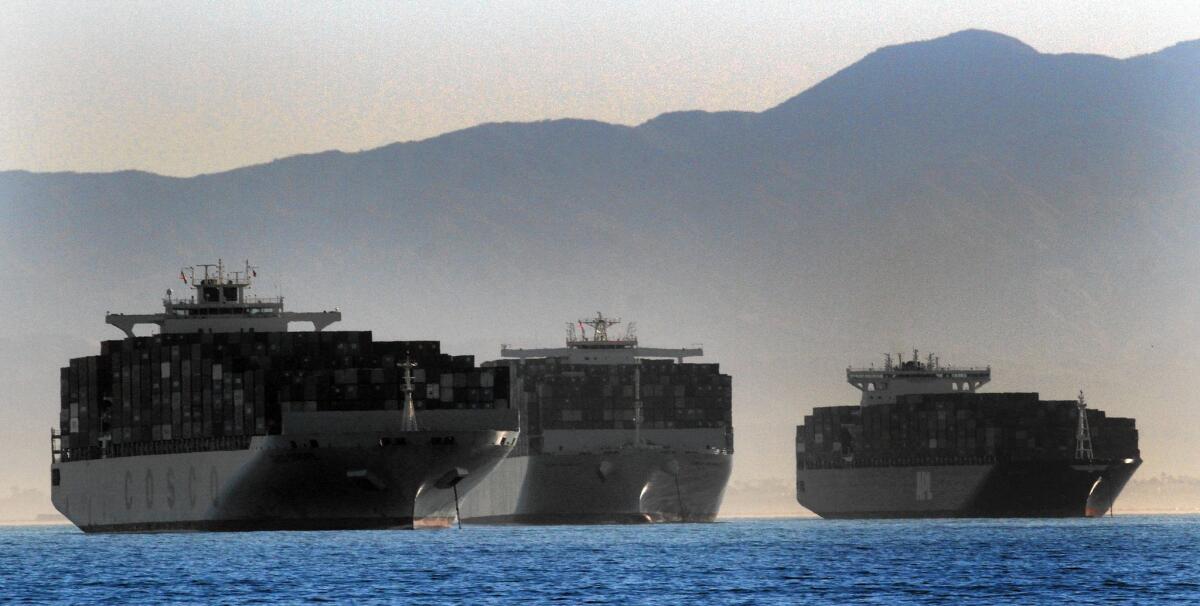If the West Coast ports shut down, who wins and who loses?

- Share via
On any given day, up to a dozen ships handle more than $1 billion worth of goods in the mammoth ports of Los Angeles and Long Beach, the nation’s busiest seaport.
Thousands of trucks carry off 40% of the nation’s incoming container cargo each year, feeding into an extensive highway and rail network that brings electronics, cars and toys to consumers and businesses throughout the nation.
Q&A: What you need to know about the port dispute
But despite the enormous volume of goods flowing through the ports in San Pedro Bay, and a long-simmering labor dispute that threatens a shutdown of 29 West Coast ports, economists and trade experts said closures would have very little effect on the broader U.S. economy. That’s because the trade of goods through U.S. ports represents only a fraction of the nation’s total economic output.
Although a shutdown would create interruptions and higher costs for businesses relying on trade with Asia, experts said those losses would be offset by greater demand at other ports or for airlines moving freight.
“There are winners and losers, and that’s where the rub is,” said Christopher Thornberg, a founding partner of Beacon Economics in Los Angeles, who has studied previous local port shutdowns. “The ports of L.A. and Long Beach are a convenient source of moving stuff in and out of our economy. Now people are inconvenienced. But inconvenience has never brought down an economy.”
Certainly many businesses would feel the pain, and have already felt it, after months of slowdowns at West Coast ports. Agricultural exporters who ship produce to Japan, China and Australia face canceled orders and spoiled food. Manufacturers who rely on parts from China are contending with work stoppages and delays.
The effects of port closures would be more acute for the Southern California economy, where local jobs in trucking, rail yards and warehousing are at stake.
“The port is an economic engine of Southern California,” said Sung Won Sohn, an economist and professor at Cal State Channel Islands who is a former commissioner at the Port of Los Angeles. “If one of the cylinders doesn’t operate properly, clearly we’ll all be hurt.”
Many workers in Southern California’s logistics and warehousing industries are temporary employees who could be easily sidelined if the flow of goods comes to a halt.
Charlie Woo, chief executive of Megatoys, a City of Commerce toy manufacturer and distributor, said the slowdown forced him to let go of more than 600 seasonal workers in recent weeks who would normally be assembling gift baskets for Valentine’s Day.
He said he has about 80 containers worth of dolls and other toys stuck at the ports. Normally he’d be receiving about 20 to 30 truckloads a day, but lately it’s been fewer than three.
“My Valentine’s business was completely destroyed, and my Easter season is on the verge of being destroyed,” he said.
The labor dispute between the Pacific Maritime Assn. and the International Longshore and Warehouse Union, which represents dockworkers, dates to last fall, when the shipping association accused union members of deliberately slowing down operations to gain an upper hand in negotiations. The local union denies using the slowdown tactic.
The two sides have been operating without a contract since July, when the previous six-year agreement ended.
They met Friday but no agreement was reached. It was unclear when talks would resume.
Even before the slowdown accusations, the ports of Los Angeles and Long Beach had faced some of the worst congestion in a decade, as workers have contended with much larger ships and a shortage of available trailers to haul goods from the ports.
Joe LoBue, a vice president for LoBue Brothers, a citrus shipping and packing house in the Central Valley, said he started to feel the slowdown in December. The company’s peak season is from January through April, and he expects to miss most of it.
A shipment of fruit set to depart to New Zealand and Australia in December left late last month.
“It’s the fresh fruit business — it’s perishable,” said LoBue, whose company is based in Lindsay. “The growing season ends in May. Whatever you miss, you miss. There’s no catching up.”
Economists don’t dispute that companies that deal in commodities such as fruit and seafood will take a hit from the slowdown and potential stoppage. But most businesses can deal with such delays — though there may be costs.
Shipping through the Panama Canal to the East Coast adds additional expense, as does transport by airplane. But many companies have chosen to eat the higher costs.
Cargo coming in and out of the Los Angeles World Airports system — which comprises Los Angeles International, Ontario International and Van Nuys airports — was up more than 9% in December from a year earlier, according to airport data. The vast majority of that increase came from cargo going to and from other countries.
“It’s going to cause disruptions and raise prices for some businesses, but it’s not going to result in a significant problem for the U.S. economy,” said Gus Faucher, senior economist at PNC Financial Services Group.
For high-end items such as cars, appliances and computers, companies will find a way to get them into the country, he said. But some lower-value products such as clothes or inexpensive electronics might simply be delayed.
“Given the cost delays and the higher expenses, it’s just not worth it,” he said. “Those are the things that’ll be most affected.”
Still, Faucher pointed out that maritime container imports across the United States amount to only about 4% of gross domestic product. For exports, it’s about 1.5%.
And for most products, delays don’t mean losses. Sales that aren’t made one week will eventually happen down the line.
“The value you see is the entire universe of what goes through the port,” said Mark Vitner, a senior economist at Wells Fargo who tracks regional economic trends. “The losses would be a tiny fraction of that.”
chris.kirkham@latimes.com; tiffany.hsu@latimes.com
Twitter: @c_kirkham; @tiffhsulatimes
Times staff writer Andrew Khouri contributed to this article.
More to Read
Inside the business of entertainment
The Wide Shot brings you news, analysis and insights on everything from streaming wars to production — and what it all means for the future.
You may occasionally receive promotional content from the Los Angeles Times.












